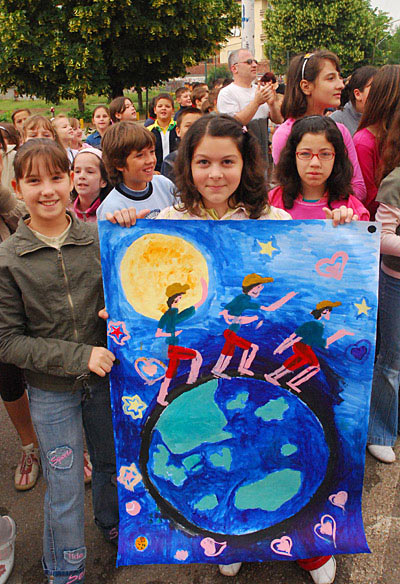In the past decade, Serbia has gone through major political changes. The eight year Balkan War ended, they transitioned from a communist government to a democratic government, and they became an independent country. While of all these changes were meant to lead to the betterment of the country - and they might do that in the future - they have created huge gaps in opportunities between the rich and the poor.
First of all, there are huge numbers of war orphans. Many of these children were adopted by families from rich countries - but so many more remain. they live in large orphanages where they do receive schooling - but the quality of this schooling is very low compared to schools for privileged students. The goal for these orphans is that they will be laborers when they are old enough to leave the orphanage - which means that there education is designed to prepare them for menial jobs in the work force and nothing more.

Still worse, however, are the opportunities for the Roma children - the extremely poor. These are the children of peasants and gypsies. They make up 7% of the population, and the majority of them do not have the opportunity to attend school at all. They begin work within their family groups at a very young age, and often work for money outside of the family beginning in the elementary years. The Roma children who do attend school are unlikely to complete elementary school. Fewer boys complete school than girls because they have more job opportunities at a young age.

Another population that is emerging as problematic is the children of war crimes. Many women were raped by soldiers, and those children are now getting older and entering the educational system. While none of the crimes of war are the fault of these children, there is a societal rejection of them. Many families do not see these children as equal to their other children, and the community often expresses a hatred of these children - as they are seen as a symbol of the atrocities the Serbian people experienced during the war. The opportunities for and future of these children is uncertain.

Privileged children in Serbia, however, attend schools considered equal to the top institutions in the continent. They will become the great thinkers,scientists, innovators, writers and politicians of the future.

Great use of pictures in your blog! It really ties it all together. I am glad you were able to contact someone for this assignment. I have not been able to reach anyone, so I am stuck with the alternate assignment. It seems like you are learning a lot about education in Serbia.
ReplyDeleteGreat blog!
ReplyDeleteI was fascinated and saddened all at the same time, by the events you've posted. I'm glad you were able to make a connection and I hope it helps you to build a global relationship that will span your journey through EC.
This sad situation was also common in Southeast Asia after the Vietnam War. As a rule, those women weren't raped but they were left behind by American GIs when the war ended. Their Amerasian children had a very hard time being accepted by other people. What a burden for a child to bear : (
ReplyDeleteI have been reading about the opportunity for schooling in other countries and they seem similar to what you posted about Serbia's education. It sounds like you have made connections with a individual with a lot of useful information.
ReplyDelete